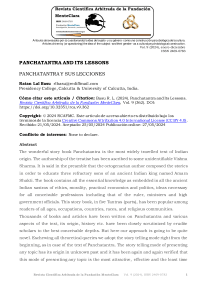Panchatantra and Its Lessons
Автор: Ratan Lal Basu
Журнал: Revista Científica Arbitrada de la Fundación MenteClara @fundacionmenteclara
Рубрика: Documentos
Статья в выпуске: 1, Vol. 9, 2024 года.
Бесплатный доступ
The wonderful story book Panchatantra is the most widely travelled text of Indian origin. The authorship of the treatise has been ascribed to some unidentifiable Vishnu Sharma. It is said in the preamble that the octogenarian author composed the stories in order to educate three refractory sons of an ancient Indian king named Amara Shakti. The book contains all the essential knowledge as embedded in all the ancient Indian sastras of ethics, morality, practical economics and politics, ideas necessary for all conceivable professions including that of the ruler, ministers and high government officials. This story book, in five Tantras (parts), has been popular among readers of all ages, occupations, countries, races, and religious communities. Thousands of books and articles have been written on Panchatantra and various aspects of the text, its origin, history etc. have been closely scrutinized by erudite scholars to the best conceivable depths. But here our approach is going to be quite novel. Eschewing all theoretical queries we adopt the story telling mode right from the beginning, as in case of the text of Panchatantra. The story telling mode of presenting any topic has its origin in unknown past and it has been again and again verified that this mode of presenting any topic is the most attractive, effective and the least time consuming mode of instilling any concept into the comprehensive faculty of the target audience or readers. Our work contains seven sections: Section-1: Vishnu Sharma and His Art of Teaching Section-2: Tantra I-Breaking off of Friendship Section-3: Tantra II-Pilgrimage for Friendship Section-4: Tantra III-War of Attrition between the Crows and the Owls Section-5: Tantra IV-Loss of Friendship Section-6: Tantra V-Thoughtless Actions Section-7: Lessons The stories are presented in five Tantras (section-2 to section-6). Each Tantra consists of a primary story and a complex structure of inter-woven secondary stories have been formed to bring to the fore the essence of the primary story. In the complex structure of the secondary stories, stories within stories may be of several stages. If a character of a story tells a story to substantiate his view, then we name this as “sub-story”. If there are further stories within a sub-story, we would call this “chain-story” and similarly there may be stories within a chain-story, i.e. chain-story-2. For example if A tells a story to B and in this story a character say C tells a story to D, this is a sub-story. Now, if in this sub-story a character, say E tells a story, this is a chain story of stage-I and so on.
Ancient history of India, panchatantra
Короткий адрес: https://sciup.org/170205783
IDR: 170205783 | DOI: 10.32351/rca.v9.362
Список литературы Panchatantra and Its Lessons
- Chunder, Pratap Chandra (1995): Kautilya’s Arthasastra, Calcutta, The M. P. Birla Foundations.
- Dharma, Krishna (Eng. Transl.) (2004): Panchatantra – A vivid retelling of India's most famous collection of fables, USA, Torchlight Publishing.
- Edgerton, Franklin (1930): The Pancatantra I–V: the text in its oldest form, Poona, Oriental Book Agency (Poona Oriental Series No. 32).
- Ganguly, Kisari Mohan (Eng. Transl.) (1991): The Mahābhārata of Krishna-Dwaipayana Vyasa (Eng. transl.), Munshiram Manoharlal Publishers, 1991, ISBN: 9788121500944, 9788121500944 (Śanti Parva, Book-12, Chapter-59, ślokas-68-73) [http://www.Mahābhārataonline.com/translation/index.php]
- Hertel, Johannes (1912): The Panchatantra-text of Purṇabhadra: critical introduction and list of variants, Harvard Oriental Series, Volume 12.
- Hertel, Johannes (1915): The Panchatantra: a collection of ancient Hindu tales in its oldest recension, the Kashmirian, entitled Tantrakhyayika, Harvard Oriental Series, Volume 14.
- Olivelle, Patrick (Eng. transl.) (1997): The Pancatantra: The Book of India's Folk Wisdom, Oxford University Press.
- Olivelle, Patrick (2006): The Five Discourses on Worldly Wisdom, Clay Sanskrit Library.
- Rajan, Chandra (transl.) (1993): Visnu Sarma: The Panchatantra, London, Penguin Books.
- Ryder, Arthur W. (Eng. Transl.) (1964): The Panchatantra, University of Chicago Press.
- Shayamacharan Pandey (1975): Panchatantram, Complete Sanskrit text with Hindi translation, Vārāṇasī, Motilal Banarsidass.
- Shri Vishnu Sharma (2014): संपूर्ण पंचतंत्र (मूल संस्कृत एवं सरल भाषा टीका) [Sampoorna Panchatantra (Original text with Sanskrit Verses) (Hindi)], Noida, India, Maples Press Private Limited.
- Wood, Ramsay (1982): Kalila and Dimna: Selected Tales of Bidpai, London, Granada Publishing Limited.


